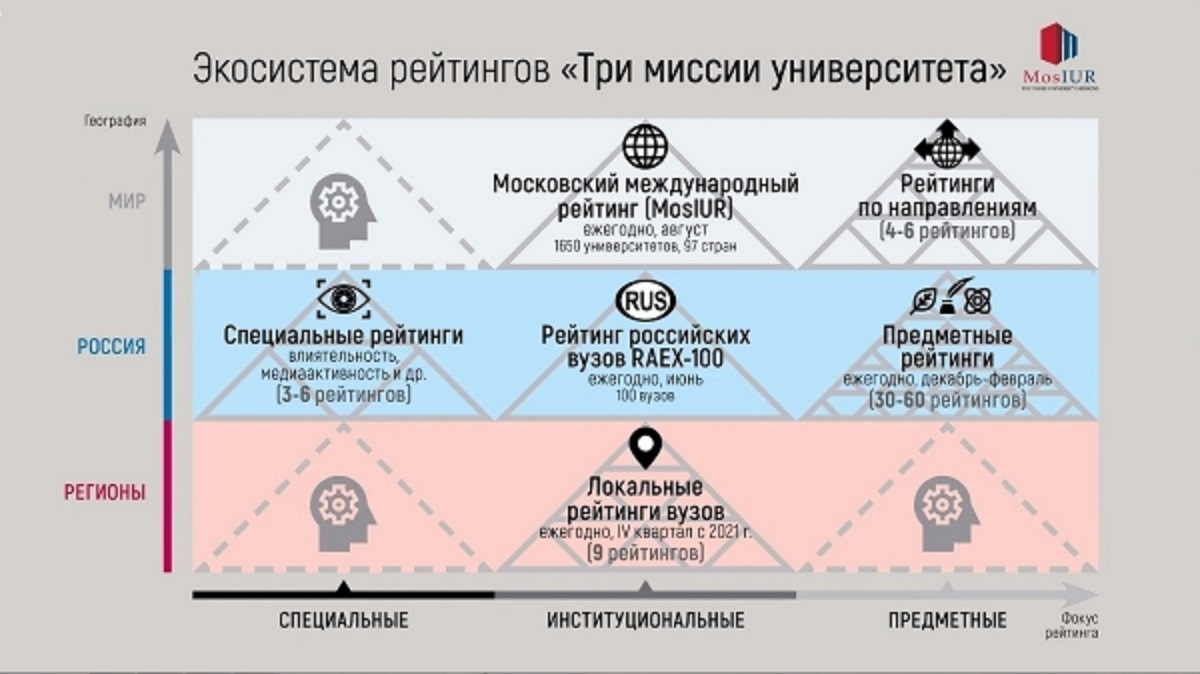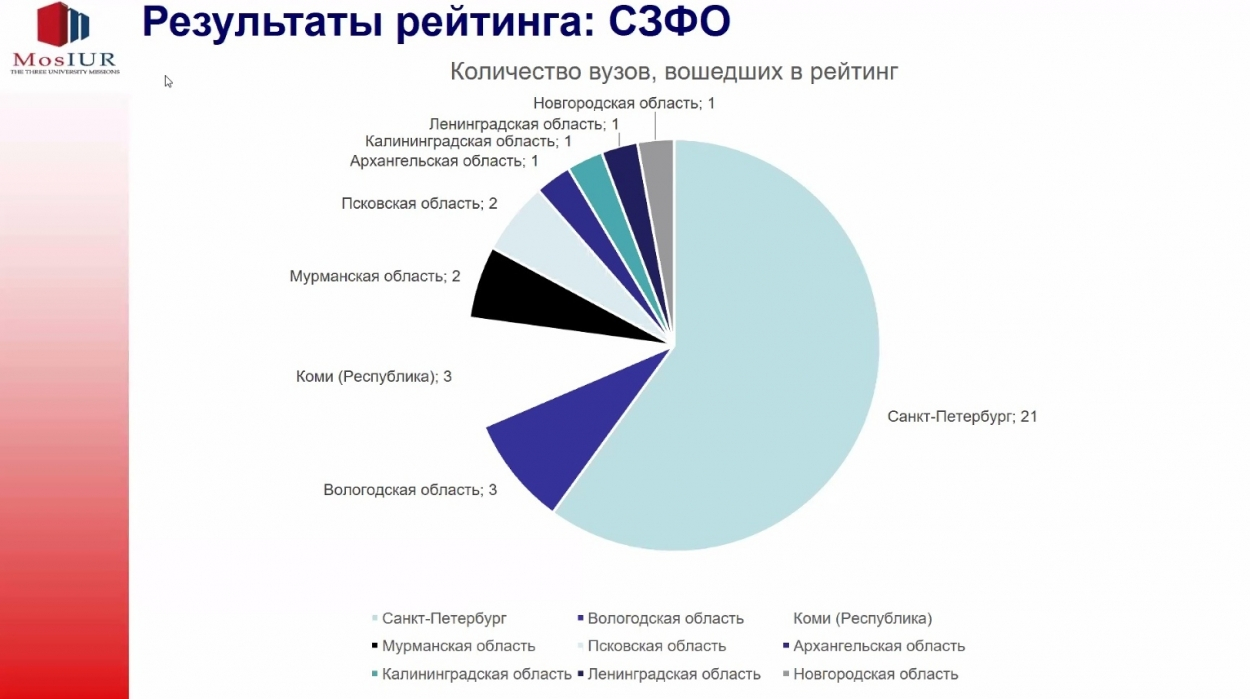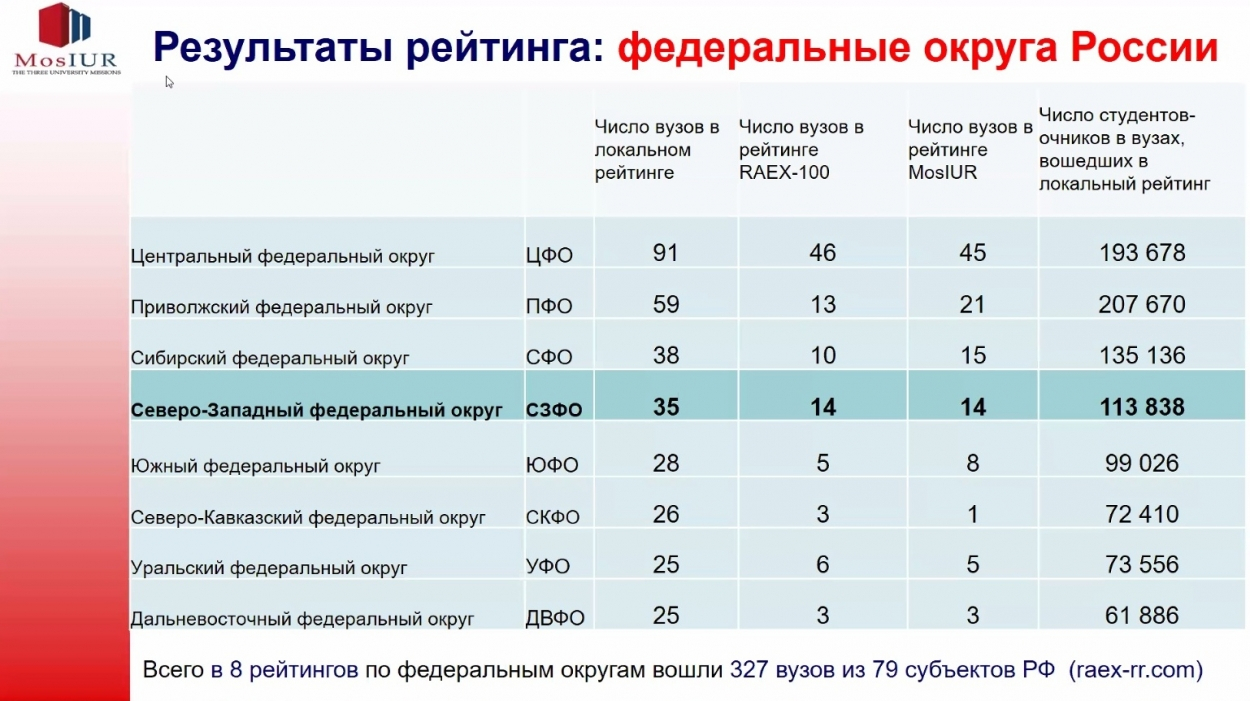University Rectors of the Northwestern Federal District discuss how universities can benefit regions
There has been an online meeting of the Council of Rectors of Universities of the Northwestern Federal District. They discussed the methodology for calculating the regional rankings "The Three University Missions" (MosIUR) and the results of the pilot release for the universities of the Northwestern Federal District. The meeting brought together deputy heads and representatives of the public sector of the Northwestern Federal District; representatives of the office of the Plenipotentiary Representative of the President of the Russian Federation in the Northwestern Federal District; and the administration of St Petersburg.

In the opening speech, Nikolay Kropachev, Chairperson of the Presidium of the Council of Rectors of the Northwestern Federal District, Rector of St Petersburg University and Corresponding Member of the Russian Academy of Sciences, emphasised that the policy of international ranking agencies was set to exclude the representatives of Russian higher education from the rankings. In this regard, developing the national ranking system "The Three University Missions", including its regional rankings, is essential.
What makes "The Three University Missions" different from other international rankings is that it focuses on the social missions that universities are set to perform. Who understands this better than regional leaders?
Nikolay Kropachev, Rector of St Petersburg University
The Rector of St Petersburg University drew attention to the fact that the idea of local rankings and evaluating methods was developed by the working group of the Russian Union of Rectors on Strategic Academic Leadership, not by the representatives of the public sector of the Russian regions. In this regard, he invited representatives of the public sector of the Northwestern Federal District to make comments and proposals for improving the system to finalise the ranking’s criteria in the way in which they would stimulate universities to develop to benefit their regions.
Dmitry Grishankov, CEO of the Association of Ranking Compilers, Advisor to the President of the Russian Union of Rectors, presented the report ‘Positions of universities in the Nortwestern Federal District in the pilot release of local university rankings in 2021 from the ecosystem of "The Three University Missions Rankings".

‘When it comes to rankings, they are mostly regarded as an academic exercise. Yet, apart from this aspect, the rankings are a kind of benchmark for universities,’ said Dmitry Grishankov. ‘We try to objectively reflect our reality and, by doing so, change it, as the universities begin to more or less actively focus on the indicators. In my opinion, regarding climbing the rankings as the main objective is absolutely wrong, yet it must be taken into account. I would advise you to approach the rankings as a mathematical model to gain a better understanding of what is good and bad. However, the answer we will get depends on what criteria we have set. So, I fully support Nikolay Kropachev’s position that the opinion of the regions is important.’
The Moscow International University ranking "The Three University Missions" was first published in 2017. Today, it represents a whole ecosystem incorporating international, Russian, and regional rankings. Among them are the Moscow International University Ranking ‘The Three University Missions’ (MosIUR) with a broad Russian segment; the Rankings of Russia’s Best Universities RAEX-100; and local rankings of Russian universities (by federal districts).

Each of them is based on the objective indicators. Yet they have different number of criteria: for example, 17 criteria are used to assess the position of Russian universities in the world, while about 40 criteria are used to compare the universities with each other. This enables us to focus on precisely national characteristics of the Russian higher education system. The indicators to analyse the quality of how the universities in the Russian top 100 work do not always ensure objective conclusions about how the regional or narrow-profile universities work. In this regard, in December 2021, a series of local rankings was presented. These rankings do not assess the Russia’s top 100 universities.
Although the tools in each case are set to evaluate specific tasks, all rankings of "The Three University Missions" share a common approach: they are set to evaluate university missions in education, research, and interaction with society.
This is what makes "The Three University Missions" unique. All other international rankings focus on only one area: science or education in terms of its internationalisation.
To ensure that the ranking is adequate and trustworthy among the Russian academic community and the employer community, the compilers tried to take into account all the key indicators of the Priority 2030 Programme. The methodology was developed by the working group on strategic academic leadership of the Russian Union of Rectors and during the consultations with foreign colleagues. Today, the rankings evaluate universities in terms of three categories: education (45%), research (25%); and interaction with society (30%). Dmitry Grishankov told the participants what indicators were taken into account in each category and why they were chosen.
Speaking about the social mission of universities, Dmitry Grisankov, CEO of the Association of Ranking Compilers, noted that the methodology to evaluate the social mission, unlike the methodologies to assess education and research, needs to be improved. He proposed that this work be carried out by the Council of Rectors of the Northwestern Federal District. The new criteria may also include the proposals of the Rector of St Petersburg University: the activities of student construction and pedagogical teams; volunteer activities; university clinics in a range of areas (for example, psychological, legal, and other types of assistance to the population of the region); the organisation of creative teams; and cooperation with business to name but a few. Dmitry Grishankov emphasised that if the representatives of the subjects of the Northwestern Federal District are actively engaged in improving the methodology of the rankings, next year evaluating universities will be based on the criteria developed in the interests of regional public sector and industry.
Summing up, Nikolay Kropachev, Rector of St Petersburg University, noted that, as the discussion of the Council of Rectors of the Northwestern Federal District showed, much in the rankings still needs to be finalised through joining the efforts of educational institutions and representatives of the regional public sector.
"The Three University Missions" differs from other world rankings by focusing on how the university works to benefit society. Educating students to follow moral rules and values is ensured by the law on education as an obligatory part of education. This is an important social task.
Nikolay Kropachev, Rector of St Petersburg University
‘I think if we study the legislation of other countries, we will not meet such requirements there. Does our ranking take it into account? Once the ranking incorporates these criteria, universities will need to develop this sphere,’ said Nikolay Kropachev.
At the end of the meeting, the Rector of St Petersburg University addressed the representatives of the envoy’s office and administrations of the subjects of the Northwestern Federal District with a proposal to create an expert group consisting of representatives of the regions to develop proposals for improving the ranking criteria.

